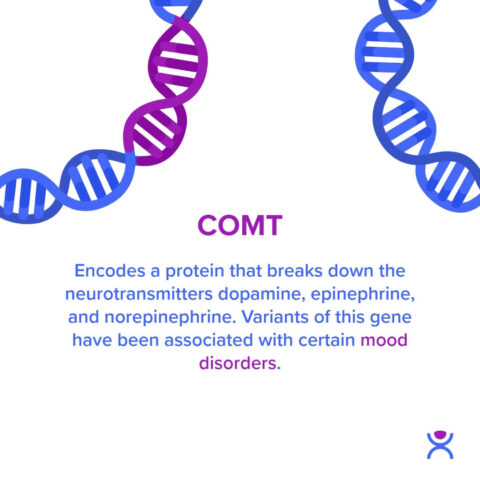
Depression can affect people of all ages. If you have a family member who has depression, you may wonder if you’ll also experience it. Is depression genetic, or are there other factors that can play a role? The truth, like almost anything involved with mental health issues, is that it’s complicated.
Introduction To Depression And Genetics
Many cultures misrepresent depression, confusing it with other negative moods like sadness, anxiety, and despair. It has been attached to ideas of strength and weakness, to notions of gender, and like many mental disorders, viewed in as negative a light as possible.
Things as nebulous and difficult to understand as depression are easy to attach a negative label to because we don’t want to deal with them.
It is, however, too important an issue to brush aside just because it’s difficult to understand or measure. Much like you can have a kidney disorder or a lung disorder, you can have disorders of the brain, which is what a mood disorder is.
These are beyond your ordinary emotional responses to various stimuli in the world. It’s normal to feel anxious about something, but an anxiety disorder is something different. It’s normal to get depressed about something, but depression is something different.
You can understand how someone could have a gene mutation that makes a body process not work properly, causing them to be more likely to get cancer. But is depression genetic?
Well, mood disorders can be thought of in the same way. A genetic mutation causes something in the brain not to work properly and makes someone much more likely to develop depression.
The fact of the matter is, depression is more than just some misfiring synapses in the brain or a chemical imbalance needed to be adjusted. It’s actually a systemic disorder, pointing once more to just how interconnected everything in our bodies truly is.
Some Facts About Depression
Depression affects more than 264 million people around the world. It can appear at any age, but it’s often diagnosed between the ages of 18 and 25. Many adults over the age of 65 also struggle with depression [1, 2].
About 16 million adults in the U.S. experience major depressive disorder in a given year. It affects women more so than men, and it’s the leading cause of disability in people 15 to 44 years old. About half of those are also diagnosed with an anxiety disorder [3].
It goes without saying that mood disorders are a significant health problem.
Depression can be the cause or symptom of many other health issues, like IBS, substance abuse, sleep disorders, eating disorders, and stress, to name a few. Diabetes and depression occur together twice as often as by chance alone, meaning they may share some biological mechanisms [4].
Again, it is not an isolated condition people suffer because something bad happened that they aren’t strong enough to deal with. It’s a health issue, plain and simple, and should be treated as such.
Not only that, but roughly 40% of differences in depression is genetics. This is why it’s important to understand what your risks are so you can address them.
So, what exactly is depression?
What Types of Depression Are There?
The clinical definition of depression involves fitting at least 5 of 9 different categories, like:
- Depressed mood
- Lack of appetite
- Feelings of worthlessness
- Suicidal thoughts
- Insomnia
- Fatigue
They must be persistent, ongoing symptoms lasting more than two weeks [5]. It is not something that someone can just snap out of.
There are 6 major types of depression, which are classified depending on cause and symptoms [6]:
- Major depressive disorder. This is what is typically thought of as “depression”.
- Persistent depressive disorder. Same as above, but lasting for 2 years or more.
- Postpartum depression. This is a major depressive disorder brought on by pregnancy and giving birth.
- Bipolar disorder. Distinct from depression, this is alternating between major depression symptoms and euphoric (manic)/irritable symptoms.
- Psychotic depression. This is a major depressive disorder along with delusions or hallucinations that have a depression theme of some kind.
- Seasonal affective disorder. This is “winter depression”, when the symptoms for major depressive disorder arise in the winter months and dissipate in the spring. This is heavily influenced by light.
Research over the past couple of decades has expanded our knowledge and understanding of what depression is and does.
“Biological processes as diverse as inflammation, neuroendocrine regulation, platelet activity, autonomic nervous system activity, and skeletal homeostasis are influenced by depression” [7]. It is far more than what we have historically considered it to be.
As our knowledge expands, so do the potential risk factors for depression, and genetics may be involved.
What Are The Risk Factors For Depression?
One of the insidious things about depression, and mental disorders generally, is how they end up being negative feedback loops.
Everyone has a pool of resources with which to deal with stressors, whether internal (mental, genetic), social (friends, family), or material (food, shelter, wealth). When the stressors exceed the resources to handle them, depression symptoms can occur [8].
How one is able to utilize and replenish their resources can vary due to a lot of factors [9]:
- Low self-esteem and/or self-critical
- Traumatic or stressful events
- Family history of mood disorders and/or suicide
- Sexual identity issues
- History of other mental health disorders
- Abuse of alcohol or recreational drugs
- Serious or chronic illness
- Certain medications
The pool of resources you have can be strong or weak, depending on your given situation. The weaker one source is, the stronger another needs to be in order to compensate. One of those resources related to depression is genetics, for better or worse.
Is Depression Genetic?
Depression is actually a systemic health issue and not purely a matter of faulty thought processes. Because of this, it should come as no surprise that there are many genes that can have an effect on it.
One of the major genes involved, due to the fact it’s so strongly related to the handling of stressors, is the COMT (“worrier/warrior”) gene.
COMT is an enzyme that helps to break down dopamine, the “motivation” molecule. A particular variant in this gene at rs4680 can make a significant difference in how you respond to stress.
If you have an “A” allele of this variant, then your COMT enzyme is less active and you thus have more dopamine in your system [10]. The result is that when dopamine rises due to responding to stress, you have an excess of dopamine. This means that response to stress is less than optimal, raising your risk for depression symptoms.
But unlike people may think, just because genetics make it more likely that you experience depression, knowing your risks can actually be an advantage.
For example, people with a certain COMT gene variant may experience greater mental health improvements from cognitive-behavioral therapy than other types of psychotherapies.
Another good example is the BDNF gene. Research on this gene is a good indicator of how different factors can interact with genetics. A study demonstrated that exercise moderates depression symptoms in adolescent girls, but when older adults were studied, it appears the same gene variant helped out men more than women [11, 12].
There are many other connections between depression and genetics. Depending on the type of stressor, the genes involved could and would be different. For instance, physical stress or trauma would incorporate other body systems and thus incorporate the influence of other genes.
This kind of interconnectedness is one reason why so many human traits are polygenic. That is, they involve multiple genes.
How Can Analyzing Your DNA Help You With Your Mood?
Having your DNA analyzed can help you understand what risk factors are relevant to you based on your genes and what you can do to address them.
The SelfDecode Mood report allows you to optimize your health by uncovering what your genes are doing behind the scenes to affect your odds of struggling with low mood.
Your mood is complicated, and it can be hard to keep track of what can affect it. One issue you wouldn’t typically consider when dealing with mood issues is inflammation.
Research indicates that inflammation plays a role in neuropsychological disorders like depression [13], where genes like IL-6 get involved. An easy way to counter an effect like this is to make a change to something like the Mediterranean diet, which is rich in things like olive oil and acts to help protect the brain [14, 15, 16, 17].
SelfDecode analyzes over 84,000 genetic variants related to your mood to give you the most precise data on your personalized report.
Unlike other DNA companies, SelfDecode goes a step beyond merely highlighting your genetic risk for mood issues. Your report also comes with evidence-based diet, supplement, and lifestyle recommendations to help you optimize your mental health.
You can easily see which recommendations work best for your body based on your DNA. This way, you can know what to prioritize in order to reach optimal health.
Concluding Remarks About Depression And Genetics
So, is depression hereditary? Your risks for it certainly are. It is important to be aware of what those risks are so you can know how to address them.
Remember, being depressed about something is not an abnormal reaction. Things happen in our lives that will do that, but understanding where your strengths and weaknesses lie can enable you to handle such situations in such a way that you avoid the more detrimental outcomes.
Understanding how depression and genetics are connected can help you be more proactive about your health. You can start today by investigating your DNA. If you want to know how your genes can affect your mood, you should check out SelfDecode.
Related Articles
- What Is A Genetic Mutation?
- Stress vs Anxiety: What’s the difference?
- Is anxiety genetic? How DNA tests for anxiety can help you
- Is ADHD Genetic? How Your Genes Can Help You Boost Attention




